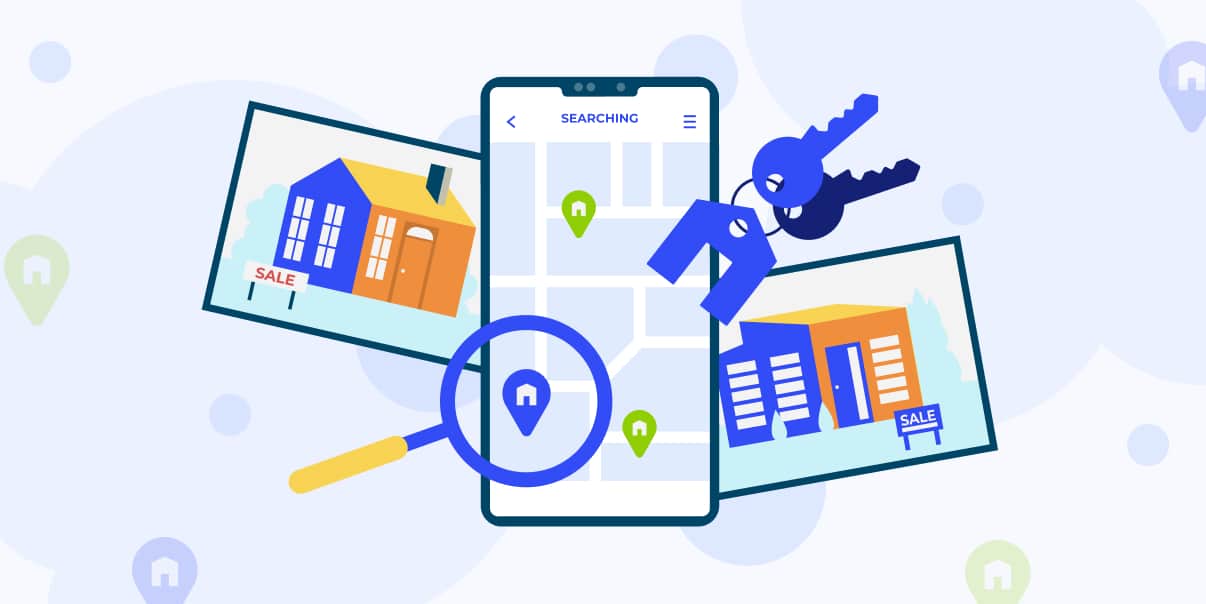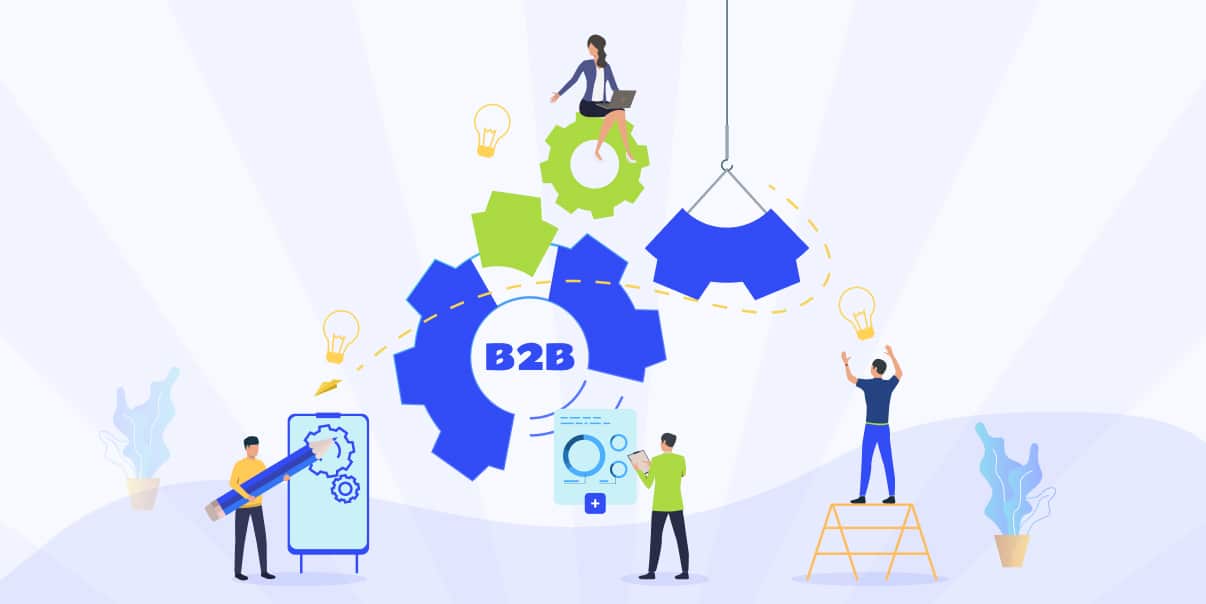Custom Real Estate CRM Software Development: A Comprehensive Guide

Real estate companies cater to different types of customers. So they must understand each customer’s needs. To do this, they often rely on custom real estate CRM software development. But what is it, and how can you benefit from this technology?
More importantly, how do you build a custom CRM platform that will support your needs and goals?
Find out in this comprehensive guide to developing customer relationship management software.
What Is Custom Real Estate CRM Software Development?
Real estate CRM systems help agents and brokers manage customer relationships. This customer relationship management (CRM) software focuses on connecting businesses with their users. It includes contact management and property listing capabilities.
Moreover, custom CRM software helps real estate agencies organize customer information. It gives companies access to analytics tools that show customers’ wants and needs.
A real estate agency can better understand its customers by leveraging CRM tools. With these tools, companies can create custom services that exceed expectations.
Benefits of Custom Real Estate CRM Software Development
![Benefits of Custom Real Estate CRM Software Development [Infographics]](https://www.bitstudios.com/wp-content/uploads/2023/06/Custom-Real-Estate-CRM-Software-Development.jpeg)
Developing custom software for real estate businesses has many benefits. More and more agencies are using CRM to scale their services and connect with more users. Here are some benefits you can get from customizing your software:
Improved Customer Experience
Custom real estate CRM software development offers many benefits. It can help improve customer satisfaction by providing automated processes. With automation, it’s easier to answer customer inquiries and track customer interactions.
Moreover, CRM real estate software has analytics tools that let businesses learn more about their customers. It helps them create better solutions for their users. It can also improve communication between departments. This way, companies can give their customers the service they need faster.
Streamlined Business Processes
A real estate CRM system can help you finish your tasks faster. It helps streamline processes, making them more efficient and less prone to errors. It ensures customers are happy and helps them get more things done quickly.
By leveraging automation tools, you can easily monitor your business processes. It will help you ensure that everything is working smoothly in your company.
Increased Revenue
Finally, developing a custom CRM system can help businesses increase their revenue. It’s because a CRM improves customer experience and provides a streamlined sales process. So, searching for products and buying them would be easier. This convenience leads to better customer retention in the long run. It also allows your company to reach its sales goals faster and at a lower cost.
Improved Data Security
Another benefit of a custom CRM system is improved data security. It ensures that all your information, like names and addresses, is safe. It uses special tools to keep everything secure so that no one else can get access to it. With this, you can ensure that only the people who are supposed to have access can see it. It helps keep your data safe and sound.
Aside from that, CRM software can help you comply with industry regulations. It will help you manage and store data in compliance with privacy laws.
Streamlined Communication with Customers
Custom CRM software development can help you communicate better with your customers. It offers a wide range of communication channels like live chat and email. This feature makes it easier for customers to reach out and share their feedback with you. With this, you can respond quickly and provide the best service possible.
Accessibility from Anywhere
Finally, a CRM system can help you access your data from anywhere. Your developers can make your app compatible with any device and platform. It will help you check your business operations and customer interactions anytime, anywhere.
Types of Custom Real Estate CRM Software Development
There are many types of custom software development for real estate businesses. These include mobile solutions, on-premise solutions, and cloud-based solutions. Let’s discuss each type in detail.
On-premise Solutions
An on-premise solution is a traditional CRM development that you purchase and install on your company’s server. This software offers more control and flexibility to the company. But, it requires a skilled IT team to manage, so it comes with higher upfront costs.
Moreover, on-premise apps allow businesses to store their data securely on their computers. They protect your data from hackers and other cyber threats.
Pros:
- Increased Security
- Customizable Solutions
- Flexible Maintenance
- Scalability
- Localized support
Cons:
- High upfront costs
- Maintenance requirements
- Limited accessibility
- Lower uptime and performance reliability
Cloud-based Solutions
Cloud-based CRM software has become popular lately. You don’t need to be in a specific place to use it — you can access it anywhere you have an internet connection. It’s usually cheaper and safer than other options and can grow with your business.
Moreover, cloud-based solutions offer businesses to back up their data in case of disaster or power outage. They help ensure that the company’s data is always protected.
Pros:
- Cost savings
- Scalability and flexibility
- Easily accessible from anywhere
- Automated software updates
- Improved security standards
Cons:
- Reliance on internet connectivity
- Vendor lock-in risk
- Possible compliance issues
Mobile Solutions
Finally, mobile solutions are the best choice for real estate businesses. Mobile CRM app development allows you to access your data even when you’re not at your desk. You can also interact with customers anywhere and anytime. This type of software uses modern technology to keep your data safe.
Pros:
- Availability and accessibility
- Cost savings
- Speed of development
- Increased engagement
- Notifications and reminders
Cons:
- Limited functionality
- User experience (UX) issues
- Security risks
Key Factors To Consider When Developing Custom CRM Software
There are several critical factors for custom real estate CRM software development. These will help you create custom services that are both efficient and secure.
Understanding Your Real Estate Needs
Before you start your custom CRM app development, you need to understand your business needs. Identify the key features that you want in the software. You should also see if your users need other functions like analytics tools.
To understand your real estate needs, you can consult business analysts. They can help you do business research to understand your customer needs. Also, consulting with professionals will help you develop the best software for your market.
Budget
You should also consider the budget when developing a custom real estate CRM app. What is your budget for customizing your software? How much are you willing to invest in this project?
Your budget should cover the development cost and maintenance and support costs. You should ensure you have enough funds to cover all these expenses.
Platform Options
Your next step is to choose the platform for your custom real estate CRM software. Do you prefer an on-premise solution, a cloud-based solution, or a mobile solution?
The type of platform that you choose should depend on your business needs and budget. It will help determine the features and functionalities you can use in your software.
Security Requirements
It is also essential to consider the security of your custom real estate CRM software. You should ensure it is secure and complies with industry regulations such as privacy laws.
You can use encryption tools and two-factor authentication to secure your CRM software. These security measures will ensure your data safety and privacy. It prevents unauthorized access so only your trusted staff can see your data.
Integration with Existing Systems
It would be best to integrate your custom real estate CRM software with existing systems. It will help you manage customer information and automate processes.
Integrating the software with other systems can take time and effort. You must ensure everything works properly before launching it in production.
Accessibility Requirements
Aside from integration and security, you must also consider your accessibility requirements. Your software must be compatible with different devices and platforms. It will help you provide better services for your customers.
Data Storage & Backup Capability
You must also maximize the data storage and backup capabilities of your custom real estate CRM software. These features secure customer data storage and back them up regularly.
Moreover, a reliable backup feature will help protect your customers’ information from hackers and cyber threats. It will also help you comply with industry regulations regarding data privacy.
Reporting & Analytical Tools
Finally, your real estate CRM app needs reporting and analytical tools. They will help you understand customer needs and preferences more deeply.
Analytics tools can provide insights into customer behavior and preferences. They help developers create better strategies for meeting their needs and exceeding expectations.
Essential Features for Custom Real Estate CRM Software
You must include essential features when developing a custom real estate CRM app. These features will help ensure that your software is powerful and efficient. So, you must choose the ones that will help you get more customers and succeed in the real estate market.
Support for Multiple Languages and Currencies
Your real estate CRM app should support multiple languages and currencies. It will help you serve customers from different countries seamlessly.
Multi-language and multi-currency support also helps to improve customer experience. It makes it easier for customers to understand your services. They can also make payments in their currency which is helpful when targeting global users.
Lead & Contact Management
Custom real estate CRM apps can help you keep all your customer info in one place. It makes it easier to remember things about them, like their likes and dislikes. Keeping track of this stuff helps you stay organized and make sure customers are happy.
Lead and contact management also helps businesses understand their customers better. They can use this data to provide custom services that exceed expectations.
Real-time Analytics & Reporting
Your custom real estate CRM apps should also have real-time analytics and reporting tools. These will help you get insights into customer behavior, preferences, and trends. They can track your progress and help you make better decisions for your business.
Moreover, real-time analytics helps streamline processes by automating reports. These features reduce the chances of errors and improve customer experience.
Interactive User Interface
An interactive user interface is beneficial for a real estate CRM app. It will make it easier for customers to navigate the app and find what they need.
Moreover, an interactive user interface helps improve customer engagement. This feature is essential to get more customers and retain them in the long run.
Integration with Existing Business Processes
Moreover, you can integrate custom real estate CRM apps with existing business processes. This feature helps to streamline operations and improve customer experience.
Integrating other systems on your software allows you to automate tasks. It includes repetitive tasks like lead management, customer support, and analytics. It will help increase efficiency and productivity while reducing costs.
Data Storage and Security Solutions
Custom real estate CRM software development requires secure storage to keep customer info. If something happens or you need to restore info, all the critical data will be safe. Your developers must also back up the information regularly.
Secure storage will not only protect user data but can also ensure compliance with industry regulations. It also helps boost customer trust in your app as their information is safe from hackers and other cyber threats.
Customizable Reports and Dashboards
Aside from other features, you must include customizable reports and dashboards in your real estate CRM software. These features will help businesses measure your progress. It can also help you make better decisions based on the data you have.
Moreover, customizable reports and dashboards can give valuable insights about your customers. This data will help you create custom solutions according to your customer needs. So you can improve your services and provide a better user experience.
Automation Tools
Your custom real estate CRM app must also include automation tools. They will help manage the sales processes and reduce costs. They also allow businesses to monitor their operations and get market insights.
Property Listing Capabilities
Property listing capabilities are also essential for custom real estate CRM software. It allows businesses to list their properties and generate more leads.
You can connect this feature with other systems like social media platforms and email marketing tools. It will help you expand your audience and increase customer engagement.
Appointment Scheduling
Appointment schedules are also critical features of custom real estate CRM software. They help businesses to manage customer appointments and streamline their operations.
These CRM software features help customers book online appointments with real estate agents. So, clients can experience better customer service and be more inclined to buy your offers.
Challenges in Implementing Custom Real Estate CRM Software Development
Developing custom real estate CRM software can be challenging despite its benefits. Here are the most common challenges you may face in the process:
Complex Project Design Requirements
It can be challenging to design software that meets all the requirements of different customers. The software must be secure and efficient, but it must also be affordable. Finding the right balance between all these factors to meet everyone’s expectations can be tricky.
Additionally, there may be different stakeholders with competing interests. It will be challenging to keep everyone happy while still getting excellent results.
Integration with Existing Systems
Integrating custom real estate CRM software with existing systems is complex. There may be issues in integrating the different system parts, leading to errors and delays.
Moreover, compatibility issues can arise if the software has no proper design. It can take a lot of work to troubleshoot these problems and get everything working correctly.
Finding the Right Platforms and DevTools
There are various platforms with different features and perks on the market. It can take time to pick the one that will work best for your software development project. Some venues may limit what you can change or customize or might not work with other tools you need.
Moreover, it would help to consider the extra costs when choosing a platform. These expenses include learning new technologies or getting additional help.
Finally, different technologies often require different development approaches. They can cause some problems for those unfamiliar with the environment they are working in.
Quality Assurance Testing
Quality assurance (QA) testing is essential when developing custom real estate CRM software. It ensures that the software meets the requirements and performs as expected.
But finding mistakes or fixing bugs in complex systems can be challenging. You must test all features, identify errors, and resolve them quickly. Moreover, you must determine the suitable testing method for your particular platform.
It can also be challenging to find competitive QA testers for your project. They must be familiar with the development process and technologies you are using.
Best Practices for Developing Custom Real Estate CRM Software
Developing custom real estate CRM software can be challenging. But you can create robust solutions that meet your customers’ needs with the right approach and best practices. Here are some best practices for developing custom real estate CRM software.
Utilize Agile Methodology
It would be ideal to use the agile methodology when developing custom real estate CRM software. This approach helps to deliver a high-quality product in a shorter period. It also allows for more flexibility and faster development cycles.
Agile methodologies involve frequent testing and feedback from customers during the development process. It ensures that the final product meets customer expectations.
Here is the process of agile methodology:
- Develop an initial product concept and vision.
- Break the idea into small sprints.
- Create a development plan with detailed tasks in each sprint.
- Execute each sprint and track progress regularly.
- Test the software after each sprint to identify any issues or errors and address them quickly.
- Involve customers in the development process by getting feedback and testing ideas.
- Repeat the above steps until the product is ready for launch.
Prioritize User Experience
When developing custom real estate CRM software, prioritize the user experience (UX). The interface should be easy to navigate and understand for customers. It should also have interactive features like chatbots and AI-driven workflows. These features will help improve customer engagement and satisfaction.
Moreover, consider colors, fonts, and layout to give your CRM software a great UX. These factors are essential for providing a better customer experience. Find reliable UX designers who can help you create the best user interface.
Your developers must also ensure that the software is compatible with different devices and platforms. It will make it easier for customers to access your app without issues.
Plan to Meet Customer Objectives
You should also devise a detailed plan to meet customer objectives when developing custom real estate CRM software. It includes providing features that meet their needs. You can also integrate your software with existing business processes.
Invest in Security Solutions
You must invest in security solutions when developing custom real estate CRM software. Developers should use data encryption tools and two-factor authentication to protect customer information. By using security measures, you can prevent cyber threats and data breaches.
You need to ensure compliance with industry regulations regarding privacy and data protection. It will help to boost customer trust in your app and increase user engagement.
Here’s a list of security features that real estate CRM software should have:
- Encrypted data storage and backups
- Data access authorization settings
- Two-factor authentication
- Granular user permissions
- Reliable cloud hosting services
- Regular system scans for threats and vulnerabilities
- Dedicated firewalls to block malicious traffic
Utilize Quality Assurance Processes
You must utilize quality assurance processes when developing custom real estate CRM software. It will help identify errors and fix them quickly.
It is essential to keep testing the software throughout the development process. It will help ensure that your product meets customer requirements. So, you must consider performing usability testing and other automated tests on your system.
Here are some of the best quality assurance processes that you can use:
- Verification Testing. This process checks the accuracy of the software code. It helps to identify errors and ensure that the product works as expected.
- Usability Testing. It involves evaluating how easy it is for customers to use your custom real estate CRM software. This test will help you understand customer behavior and improve customer experience.
- Performance Testing. This testing process helps to measure the system’s performance. It is essential when developing real estate CRM software as it must be efficient and reliable.
- Automated Testing. In this process, you will be running tests on the software automatically. It helps identify errors quickly and ensures that the system works as expected.
Maintain Flexibility Throughout the Entire Process
Maintaining flexibility when developing custom real estate CRM software is also essential. Flexibility ensures your software development’s success and helps resolve issues.
Also, it pays to be open to new ideas, customer feedback, and requirements changes. Your development team must be able to adapt to changes quickly to avoid any delays.
A flexible approach will also help you make better decisions when developing the software. It allows you to take risks and experiment with new ideas. With this, you can improve customer experience and increase user engagement.
Find the Right Development Partner
Find a team of experts to help you create custom real estate CRM software. It’s vital to choose someone who understands your technologies and has experience developing similar solutions.
Moreover, your development partner should understand what your customers need and be able to deliver results on time. That way, the final product will exceed expectations and succeed in the market.
Here are some tips for finding your CRM software development partner:
- Research the company’s portfolio
- Read customer reviews and testimonials
- Get a detailed project plan and timeline
- Understand their methodology and process
- Check the team size, skill set, and experience
- Ask for references from previous clients
Future of Custom Real Estate CRM Software Development
With the help of technology, developers can create innovative software for real estate CRM. This type of software can take complicated tasks and break them down into simpler ones. It makes them easier to understand and use. It can also learn from customer info to give valuable insights to improve businesses.
In the future, custom real estate CRM software will be even better. Companies can offer personalized options and automation to make life easier for customers. There will also be better technologies for integrating and managing data.
Emerging Trends and Technologies in CRM Software Development
In the future, developers can create better solutions for custom real estate CRM software development. Some of these are:
- Artificial Intelligence. AI-powered features will provide businesses with valuable insights into customer behavior and preferences. You can use this data to customize the experience and improve customer engagement.
- 5G Connectivity. With 5G, businesses can connect with customers in real time. This technology will enable them to offer better customer service. It can also provide more personalized experiences to users.
- Data Security Tools. Companies must invest in data security tools to protect customer information from cyber threats. They should also comply with industry regulations regarding privacy and data protection.
- Cloud Computing. Cloud computing will enable businesses to store and access data quickly and securely. It will also help them reduce operational costs and increase efficiency.
- Blockchain Technology. This technology will help companies to track and secure customer information more effectively. It also allows for faster and more secure transactions, boosting trust in the system.
Innovation Opportunities in the Real Estate Industry
The real estate industry is changing quickly with new technologies and trends. To stay competitive, companies must use custom CRM software to keep track of customer data. A CRM app will also help them in project management more efficiently.
Developers should also focus on creating innovative solutions that improve customer engagement. It could involve leveraging AI-driven workflows and incorporating virtual reality technology.
Custom real estate CRM software development will be even more significant with the latest technologies.
Predictions for the Future of Custom CRM Software in Real Estate
In the future, custom real estate CRM software development will continue to evolve and be in high demand. More companies will start using this type of software to stay competitive. There will be a lot of need for custom-made software to fit a real estate company.
Here are some of the latest predictions for custom CRM software:
- Market in CRM. Business Insights predicts that the CRM market will grow from roughly $64 billion in 2022 to $146 billion by 2029. It includes the real estate industry.
- Voice and Conversational UI. Developers will utilize voice and conversational UI to provide customers with better customer service. Experts predict that there will be 8.4 billion units of voice assistants by 2024.
- Artificial Intelligence. There are more possibilities for AI-driven features in custom real estate CRM software. According to studies, explainable artificial intelligence (XAI) will blow up to $21.03 billion by 2030.
- Mobile CRM. With more people using mobile devices, developers will focus on custom solutions for mobile platforms. It will enable businesses to provide better customer experiences and boost engagement.
- Self-service CRM. Self-service CRM solutions will allow customers to access information quickly and easily. It will improve customer satisfaction and reduce their dependence on customer service staff.
Conclusion
Custom CRM software can help a real estate business in many ways. It makes it easier to help customers and be more efficient in completing tasks. But developing the software can sometimes be challenging. To make sure the project is successful, you can use agile methodology. Make customer experience your priority and invest in security solutions.If you need help developing your custom CRM software, BIT Studios can assist you. We have a team of experienced developers who will work with you to create a system that meets your needs. Contact us today to learn more about how our service.
We’re BIT Studios!
At BIT Studios we specialize in designing, building, shipping, and scaling beautiful, usable products with blazing-fast efficiency



